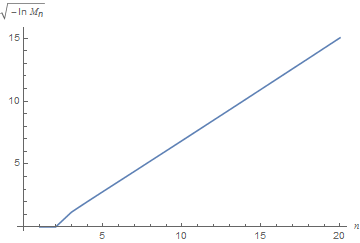The problem is to find the asymptotics (as $n\to\infty$) of the maximum (say $M_n$) of the Vandermonde determinant $$V_n:=\prod_{0\le i<j\le n-1}(a_j-a_i) $$ over all $a_0,\dots,a_{n-1}$ such that $0=a_0<\dots<a_{n-1}=1$ (or, better, an upper bound on $M_n$ which is asymptotic to $M_n$; or, at least, the asymptotics of $\ln M_n$). It is clear that the maximum is attained.
These questions can be obviously restated in terms of the minimization of the logarithmic energy $$\sum_{0\le i<j\le n-1}\ln\frac1{a_j-a_i}. $$
I have encountered this problem working on a matter involving higher-order divided differences. It is known that the $n$-tuple $(a_0,\dots,a_{n-1})$ maximizing $V_n$ is given by the formula $a_i=(1+x_i)/2$, where the $x_i$'s are the roots of the polynomial $(1-x^2)P'_{n-1}(x)$ (taken in the ascending order) and $P_{n-1}$ is the Legendre polynomial of degree $n-1$; these points $x_0,\dots,x_{n-1}$ are also known as the Fekete points; see e.g. SE Mathematics. The picture below suggests that $\ln M_n\sim-(a+bn)^2$ as $n\to\infty$, for some real constants $a<0$ and $b>0$.

